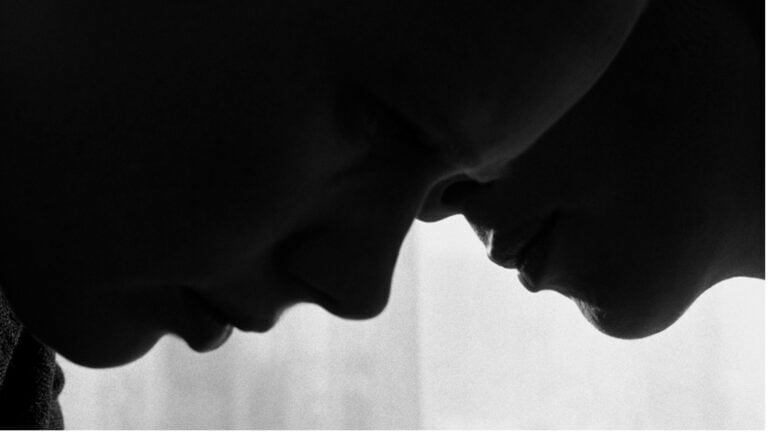I’d be amongst the most lucky and unlucky individuals when it comes to Autumn Sonata for a good reason. I had the tremendous opportunity to watch this film and then listen to Liv Ullmann speak about it afterward in person at the BFI. Unlucky I was, however, because I couldn’t ask her the one question that managed to reach my palate. Not of my own doing, but it left a small-sized hole of a regret that I will carry whenever I re-watch this film again. Grateful, nonetheless, because she still managed to present us with her ageless joyfulness.
In my exploration of Bergman’s oeuvre, I’m not adhering to any particular order. Perhaps, I was a bit fortuitous when I watched Persona first and Autumn Sonata right after. The former is frightfully silent, and the latter is relentlessly verbose. There, Ullmann torments Andersson with her unyielding silence and here she excoriates Bergman (the actress) for being the negligent mother that she was. This sharp contrast lingered and made me think – how would have Bergman (the director) prepared her for these two contrasting roles? How would the instructions have been and did their dynamic of director-actress change or did it change at all? Unfortunately, an already short queue was cut even shorter by the moderator before I could reach the mic.
Autumn Sonata is a relatively short, yet precisely orchestrated affair. It opens with an unusual breaking-the-fourth-wall scene – Viktor, Eva’s husband, secretly steals a look at his wife and turns to us to say that she’s been terribly under-loved and that he wishes to tell her that she is loved wholeheartedly, but he can’t seem to find the words. As he confesses, we see Eva. She’s putting pen to paper in a solemn manner. Wrinkles, braided hair, and bottle glasses stand out in the close shot that Bergman puts upon her. She’s old, yet her choice of clothes suggests that she’s stuck in infancy. We later realize that she’s expecting her pianist mother Charlotte, who has decided to visit after seven years. As soon as the first embraces fade away, we observe that unspoken tensions are frothing beneath mother and daughter. When quizzed about the look she sported in the film, Ullmann said that she and Ingmar made that choice together so they could portray the exact look of a girl that doggedly tries to earn the affection of a mother who has hardly lavished it. As dinner arrives, Charlotte spots Eva’s piano and sits next to her, nudging her to play. She obliges and Charlotte, though initially pleased, soon displays a disgust that hasn’t fully emerged from the smile that conceals it. Eva insists and Charlotte decides to correct her. As she falls into her art, we see Eva; her eyes look tender and severe in equal measure as she fixates a dour gaze on her mother, surely reproachful that the keys of her piano have received more tenderness from Charlotte than herself. And without saying a word, Ingmar has established the central relationship of his film. This right here is sheer mastery over subtext in the film language.
But once this friction is made palpable, Bergman manoeuvres it in such a way that he plumbs its depth more intensely in certain moments than in others. This is probably why the film feels like an oscillating arc that moves in troughs and peaks before we reach the rubble that lies in the wake of what has transpired between these two women. This quality of his film-making, not just in Autumn Sonata, places him in that sacrosanct legion of directors who exist a cut above the rest. Moments become hours, years, and months in his hands. He corners you and holds you taut with one long exposition of an emotion until it sears itself in your mind. Here, he pushes Charlotte and Eva to collide many times throughout the film. When Charlotte sees Helena, her paralysed second child, she stomachs her fleeing instinct, and the three embrace. But when you see Eva, you can’t help but wonder how much disgust is running through her for this mother who has been so oblivious to her own neglect. In another scene, Eva recollects the loss of her only son Erik and pours out her unbearable emotion to Charlotte, only for her to say that the weather is too nice to forego a walk. The daughter is splintering on the inside with emotion and the mother is abjectly devoid of it. When the final flurry of words does take place, and Eva recollects the horrors of loneliness that she was subjected to by her mother, Bergman’s parsimony with the fade-ins he provides is again proof of his stature. Eva recollects many hours of darkness, but Bergman pauses only to show the most desolate – when Eva rests her head on her father’s lap and the smoke from his pipe envelops them in that staid library. He gives form to the moments where Eva felt the absence of maternal warmth the most. Ullmann in her teary recollection is sublime, and she doesn’t stop lacerating her mother with words, almost as if to say that in this court of trial, you have no branches to cling onto and no shields to deflect with. At the end of this verbal flogging, Charlotte is devastated and resignedly whispers – “Won’t you embrace me? Touch me, at least”
At this moment of truth, she implores for tenderness, not repentance. Bergman had mentioned that he initially conceived a scene where-in a daughter would give birth to her mother, but he soon discarded it. But the conclusion of this film opens a window into how his train of thought led him to that particular image. As a child, before becoming a woman or mother, Charlotte states that she didn’t receive love or warmth from her own mother. Now, she feels that she’s merely perpetuated that cycle of frozen distance, afraid of the slightest emotions that she never had the privilege of experiencing. Destitute of excuses, she looks to Eva – a daughter who has been a mother twice, once in her absence to Helena, and once in her own right to Erik. When the film draws to a close with that final intercut with both mother and daughter facing the camera, we can see the role-reversal that Bergman envisioned with the rebirth; it’s his way of saying that in this cycle of hatred, perhaps when the daughter becomes the mother, her love can force its cessation.
Outside this two-woman world, the only verbal element is Viktor, Eva’s husband. His presence in the film feels almost supernatural as if his only purpose of existence is to bridge us and Charlotte with Eva. During her recollection of her brief period with Bergman as his partner, Ullmann recollected that there were many days when she and her daughter stood outside his room, a space that was filled with both smoke and music. At this point, I couldn’t help but ask myself if Viktor wasn’t a fragment of Bergman himself. Early in the film, basking in smoke and sonatas, he pauses to read Eva’s letter to her arriving mother. Shortly after Eva storms out to attend to Helena, he gently recollects to Charlotte the blissfulness he saw on her face when Erik was born; she finally felt that, through her son, she could right the wrongs inflicted upon her. Bergman perhaps was drawing heavily from experiences in his life, as all directors do. Viktor then only serves as an apparatus of memory (Bergman’s perhaps) that fills in the absent verses of Eva’s life for the uninformed viewer and mother.
Bergman’s entire repertoire as a director always holds timeless importance, but now more than ever, its exigence in the present moment is undeniable. In an age of disappearing mothers and motherhood, Autumn Sonata’s relentless piercing seems like a pill to combat increasing maternal neglect. The rejoinder then may be – well, what about the men? Are they absolved of their crimes of absence? They certainly aren’t either. Men too, need to be indicted for their absences as fathers and subjected to eyes as unforgiving as those of Eva. A man who puts art above his children is considered normal in a way that a woman is not, writes Farran Smith Nehme on Bergman’s own neglect as a father, and I concur. To want the best of both worlds only to lead one way of life at the cost of another is far from being agreeable or acceptable. If one chooses to have a family, then the need to be ever-present to support them supersedes everything else. I’m yet to watch a cinematic portrayal that is both unforgiving and sans-excess as it explores the absent father-wayward son dynamic. Perhaps it might already exist, or it may have to reach us in the years to come; either way, I shall watch with it equal rigour.
Bergman’s cinema for me always achieves that ideal of being a mirror of life. As a viewer, it’s what you’d want. It strikes the mark of being depictive without explicit judgement from its creator. Throughout Autumn Sonata, there are moments where you feel sorry for Eva – as in when she recounts years of being repressed, and at times, you also feel she’s been too unjust when she accuses her mother for the actions of her late companion. It’s never a rigid staccato where the characters begin from a moral point A to end at moral point B with tones of music telling us when the character is faltering. The world would be a terrible bore if you could divine all the director’s intentions in one fell swoop. With Bergman however, the door is always open for a revisit. Every time you walk through it, you notice something different in his house that somehow informs you more about yourself as a viewer. That’s something that only special directors can do, and I hopefully can come back and keep drawing from his well.




